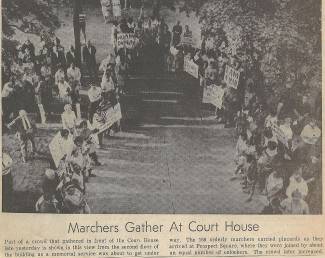Collection Name
About
Civil Rights Rally, 1968 - Allegany County Courthouse
On June 19, 1968 over 170 "orderly" marchers rallied in front of the Allegany County Court House on Washington Street. The civil rights rally and following memorial service were held in conjunction with "Solidarity Day", a major event being held in Washington at the same time. Participants carried signs calling for human dignity and peace in Vietnam, as well as placards stating "I AM A MAN", which became famous for its usage just a few months before during the Memphis (Tennessee) Sanitation Workers Strike and marches. The number of participants, and spectators, increased as the afternoon progressed.
The following excerpts are from an Associated Press story out of Washington D.C. which appeared in the Cumberland News, June 20, 1968. It describes the June 19th "Solidarity Day" events that were happening in Washington on the National Mall simultaneous with the Allegany County Courthouse march and rally.
Poor People's Supporters At Lincoln Memorial
Supporters of the Poor People's Campaign jammed the area at the Lincoln Memorial in Washington yesterday. This air view was taken at the height of the "Solidarity Day" program and demonstration.... Police estimated the throng at 50,000 persons. Only minor incidents disturbed the 4,300 police and National Guardsmen who protected the nervous capital, and the sunny, warm weather was ideal for the turnout of men, women and children who carried placards, blankets and picnic baskets. Many jumped into the hip-deep waters of the Reflecting Pool to cool off.
Massed thousands at the Lincoln Memorial roared their approval Wednesday of a plea by Mrs. Martin Luther King Jr. to end "the most brutal and evil war in history" and pour its costs into a total war against poverty. The widow of the assassinated Negro champion of nonviolence gave to Solidarity Day, a vast, peaceable, daylong outpouring of support by whites and blacks for the Poor People's campaign, its most dramatic moment and won its greatest ovation. She spoke almost at the end of a day in which 50,000 persons, by police estimate, surged from the Washington Monument to the memorial to make their appeal for more food, more jobs and more welfare assistance. Less massive than the 1963 March on Washington, the day was nevertheless a triumph for the dissension plagued Southern Christian Leadership Conference. The marching thousands, orderly though disorganized, stretched from the Washington Monument to the Memorial.
Abernathy Vows To Stay -- The Rev. Ralph David Abernathy, successor to King as SCLC leader, vowed to stay in Washington with the impoverished inhabitants of Resurrection City which was within easy reach of his voice.
"Some of you may go home," Abernathy roared, "but the rest of us are staying here, ready to' go to jail." Toward the end of his speech in early evening, Abernathy departed from his prepared text to declare he intends to stand "before Lyndon Baines Johnson and tell him to let my people go. I shall be free some day," he concluded. The crowd cheered a plea addressed by Mrs. King to American women to join in urging the President "to stop the bombing of Vietnam now, in order that a settlement of the war can be negotiated." "One hour of war," she said, "could buy your community a new school, hospital or social center. We, the women, must lead the way in adopting nonviolence as a way of life." Mrs. King recalled the "I have a dream" speech of her husband from the same spot in August 1963, and closed her address with his words--"Free at last, free at last..." The crowd took up the chant with a tremendous roar at that point, and drowned out her final words.
Note: The Poor People's Campaign was organized by Martin Luther King, Jr.(1929-1968), Coretta Scott King (1927-2006) and the Southern Christian Leadership Council (SCLC). Its primary goal was to address issues of economic justice for the nation's poor. The Campaign originated in Mississippi and was to culminate in a major march in Washington, DC. Martin Luther King, Jr. was assassinated on April 4, 1968, but the campaign continued under the leadership of the Reverend Ralph David Abernathy (1926-1990) who also assumed the presidency of the SCLC. The Poor People's Campaign, with only 7000 participants, arrived in Washington in May 1968 and for the next several weeks attempted, unsuccessfully, to secure an "economic bill of rights" for the nation's poor. It was during this period that the campaign erected "Resurrection (tent) City" on the Federal Mall.
Note: "Juneteenth" is regarded as the oldest civil rights holiday in the country commemorating the ending of slavery. It goes back to June 19, 1865 when Union troops arrived in Texas and announced that the Civil War had ended and those who were enslaved were now free. Unlike President Lincoln's earlier Emancipation Proclamation, the Confederate surrender and the presence of Federal troops made emancipation a reality. "Juneteenth" soon became a celebration of freedom not only in Texas, but in communities across the nation. The event died out during the early 1900's. However, a resurgence occurred during the Civil Rights Movement of the 1950's and 1960's, and in particular during the 1968 Poor Peoples Campaign. It was during that event, on June 19, 1968, that Solidarity Day was conducted with speeches calling for economic justice, peace, social and civil rights.
Photograph and article: The Cumberland News, June 20, 1968, provided by Margie Eirich, City Clerk, City of Cumberland.
